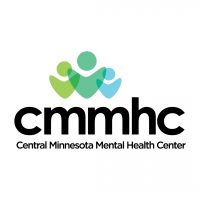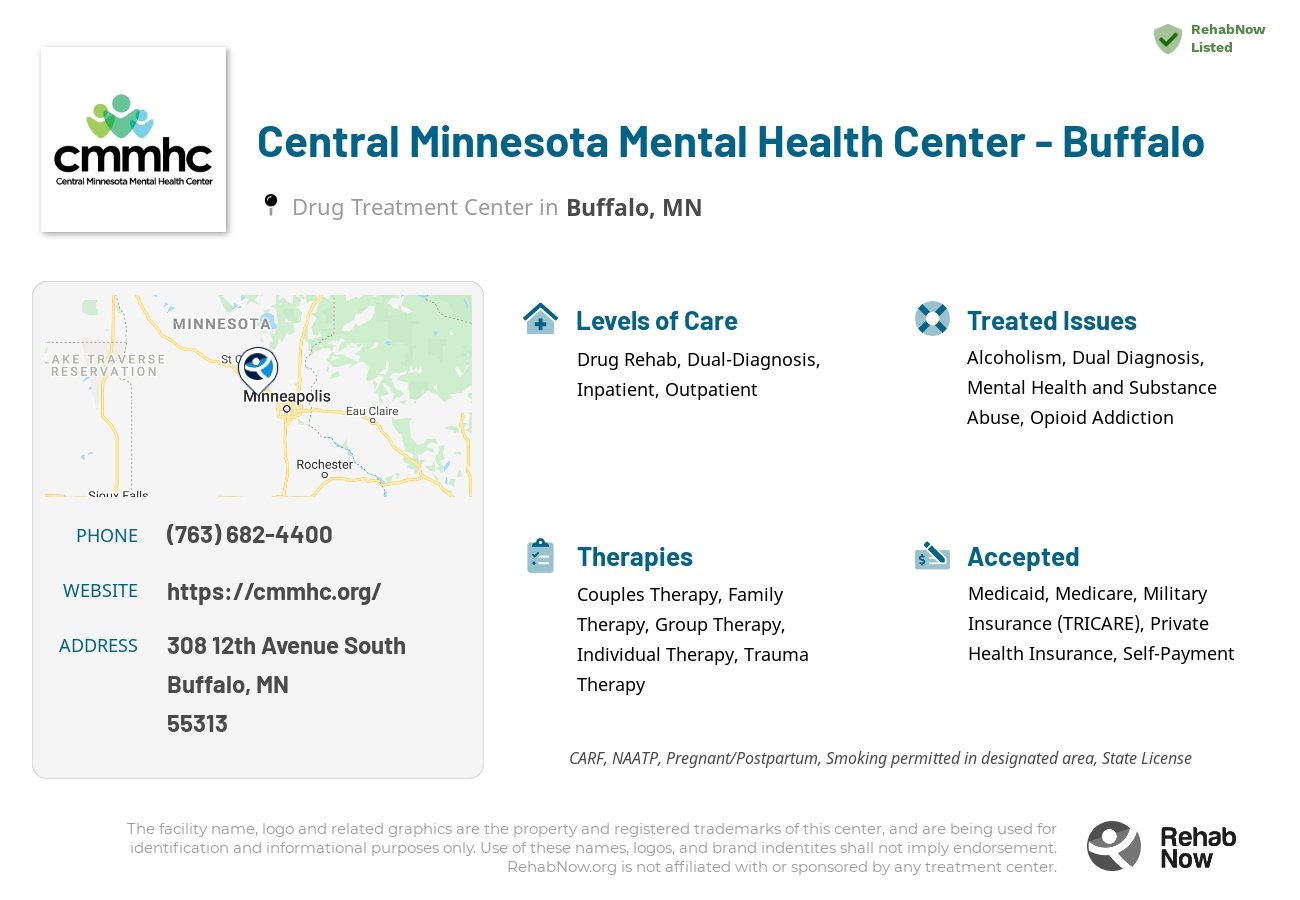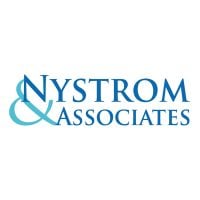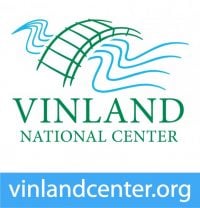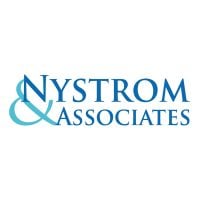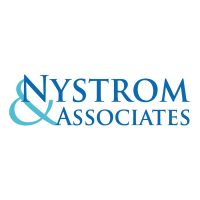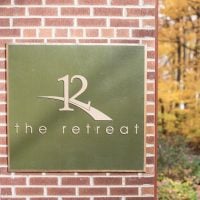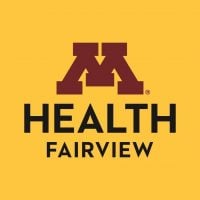Central Minnesota Mental Health Center - Buffalo
Drug Rehab Center in Buffalo, Minnesota
Central Minnesota Mental Health Center - Buffalo is a comprehensive mental health services provider located in Wright County that offers a range of individualized, evidence-based treatment programs tailored to each person’s needs, including addiction and substance abuse treatment, trauma treatment, and specialized programs for veterans and gender identity, and is accredited by The Joint Commission and recognized by the Minnesota Department of Human Services.
About Central Minnesota Mental Health Center - Buffalo in Minnesota
Central Minnesota Mental Health Center - Buffalo, located in Buffalo, Minnesota, is an addiction treatment facility that was founded in 1959. They specialize in treating individuals suffering from alcoholism, dual-diagnosis (mental health and substance use disorders), opioid addiction, and drug addiction. The facility offers various levels of care including drug rehab, dual-diagnosis treatment, as well as inpatient and outpatient programs. Central Minnesota Mental Health Center - Buffalo is an affiliated center of the larger Central Minnesota Mental Health Center network.
Central Minnesota Mental Health Center - Buffalo is dedicated to providing effective and comprehensive services for individuals struggling with addiction and substance abuse. Their treatment approach incorporates evidence-based methods to address the specific needs of each individual. Through their drug rehab programs, they aim to help patients overcome dependence on alcohol, opioids, or other drugs. Their team of experienced professionals offers dual-diagnosis treatment for individuals dealing with both mental health and substance use disorders. The center provides options for both inpatient and outpatient care to accommodate different preferences and needs during the recovery process. They accept private health insurance, ensuring accessibility to their services for those with coverage.
Genders
Ages
Modality
Additional
Conditions and Issues Treated
Opioid addiction has become a significant health problem in the United States. When a person’s life becomes unmanageable because of an opioid addiction, treatment can help them get sober. Treatment includes medical care and counseling.
“With so many people struggling with opioid addiction, we need more care and attention for those who want to quit. Opioid addicts often take opioids when they experience a painful injury – that’s how the cycle starts! When someone begins taking their medication differently than prescribed or takes an excessive amount of drugs, it means they’re hooked on drugs and in danger of overdosing.
The most successful way to beat this is through detoxing from these types treatments at Central Minnesota Mental Health Center - Buffalo in . Most facilities start by using medical support during the process while providing counseling services; rehabilitation comes later on after treatment has been completed successfully.
A “dual diagnosis” is when the individual has two medical issues at the same time. The top co-occurring mental disorders with addiction are depression, anxiety, ADHD, bi-polar disorder. Addiction is also considered a mental illness that is not a choice but rather a medical condition. Addiction can be caused by any number of underlying issues.
Dual diagnosis is provided by Central Minnesota Mental Health Center - Buffalo to treat addictive tendencies as well as any untreated mental illnesses. This ensures successful long term health and recovery for patients after treatment has been completed.
Dual diagnosis is provided by Central Minnesota Mental Health Center - Buffalo to treat addictive tendencies as well as any untreated mental illnesses for people in Minnesota. This ensures successful long term health and recovery for patients after treatment has been completed.Levels of Care Offered
This center offers a variety of custom treatment tailored to individual recovery. Currently available are Drug Rehab, Dual-Diagnosis, Inpatient, Outpatient, with additional therapies available as listed below.
Going to an inpatient rehab facility means living there while all aspects of addiction or co-occurring disorder get addressed. The treatment involves medical supervision, therapy, and future planning.
This type of rehabilitation provides a drug-free environment for people who struggle with chronic/long-term addiction without having access to drugs outside the center (or their own home). It takes away any distractions because they live there 24 hours per day. If someone is trying to break out old habits, which could lead them back into substance abuse, things like jobs or school can be put on hold until after they complete their stay to focus solely on recovery.
Outpatient programs at Central Minnesota Mental Health Center - Buffalo, the Buffalo resident can live with their family while continuing with their job or studies. Treatment includes educating the patient on drug abuse, medications, and counseling sessions at the individual or group level. Outpatient treatment plans cover diagnosis, detoxification, management, and counseling. They are a popular option for those who have graduated from inpatient facilities.
Therapies & Programs
Individual therapy is a form of counseling where you meet with a trained professional one-on-one. Meeting with a therapist in this setting allows for a personal and trusting relationship to be built. This allows the patient to open up about sensitive or private issues they may not feel comfortable discussing in a group. Individual therapy helps identify the root causes of your addiction, which can help prevent relapse.
Couples therapy for drug addiction is a unique form of therapy that allows family members to work through the emotional issues of their loved one’s addiction together. Family members can support each other while learning how to cope with the addiction and encourage healthy changes. The two will work with a therapist to learn how the addiction affects themselves and the relationship.
Family therapy is often done alongside drug treatment to help addicts stay sober. The goal of family therapy for drug addiction is to create an environment where communication can happen without judgment, hostility, or blame. The therapist will sit with the family so they can learn how to communicate differently and provide new tools for dealing with emotions so that people don’t want to drink or do drugs. It’s important for families to focus on relapse prevention plans during treatment so that if the addict feels like they want to use again, they’ll know what steps they need to take together to prevent it from happening again in the future.
Group therapy sessions are another common addiction recovery service. These group sessions typically involve six to 12 addicts who meet regularly with a trained professional for support and guidance.
During these sessions, the group shares their experiences with one another and provides feedback that can help each member avoid relapse or overcome specific obstacles they are facing in their recovery process. With this type of support and guidance, addicts can feel like they are part of a community that understands their struggles and will help them get through the hard times.
Many people struggling with drug addiction have experienced some form of trauma in their lives. It is crucial that these individuals seek out professional help; otherwise, their drug abuse and addiction will likely continue.
Therapists and counselors at drug treatment centers employ several treatment programs to help people struggling with drug addiction, including trauma therapy. Trauma therapy helps people dealing with addiction by allowing them to confront the traumas of their past and move past them.
It is important to note that trauma therapy should not be confused with PTSD (post-traumatic stress disorder). Rather, it is used to treat the effects of trauma, which are often at the root of addiction.
Cognitive Behavioral Therapy (CBT) focuses on the underlying thoughts and behaviors that caused the problem of addiction in the first place and may cause a relapse. Negative feelings are common in drug abuse disorders, but they can lead to co-occurring disorders if not recognized. CBT involves strategies that help to change the behavior pattern by restructuring negative thoughts into positive ones. It helps to remove these feelings, and it provides long-term benefits. Also, CBT promotes self-awareness and self-control. It can be administered as a monotherapy or as part of combination therapy.
CBT can improve the patient’s mood, reduce drug cravings and boost success rates on treatment plans. Regular practice can help individuals handle negative attitudes, thoughts, and feelings without turning to drugs or alcohol. The core belief of Cognitive Behavioral Therapy (CBT) is that one’s moods, behaviors, and actions are all connected. Individuals can improve their quality of life using CBT. It helps addicts understand the patterns of thought and feelings that cause them to use drugs or alcohol and develop a healthy response.
Payment Options Accepted
For specific insurance or payment methods please contact us.
Is your insurance accepted?
Ask an expert, call (888) 674-0062
Central Minnesota Mental Health Center Associated Centers
Discover treatment facilities under the same provider.
- Central Minnesota Mental Health Center - Elk River in Elk River, MN
- Central Minnesota Mental Health Center - Monticello in Monticello, MN
Learn More About Central Minnesota Mental Health Center Centers
Additional Details
Specifics, location, and helpful extra information.
Buffalo, Minnesota 55313 Phone Number(763) 682-4400 Meta DetailsUpdated November 25, 2023
Staff Verified
Central Minnesota Mental Health Center - Buffalo Patient Reviews
There are no reviews yet. Be the first one to write one.
Buffalo, Minnesota Addiction Information
Minnesota is fighting an opioid epidemic that is leaving hundreds of its residents dead each year. Both prescription opioids and illicit opioids are widely abused in the Land of 10,000 Lakes. Heroin continues to be one of the most commonly abused drugs in the state, if not the most common illicit drug. Over 10% of all treatment admissions in Minnesota list heroin as their drug of choice.
9,000 people abuse drugs or alcohol in Buffalo, MN. The city has seen a rise in drug addiction in recent years. The most commonly abused drugs are methamphetamine, heroin, and cocaine. Alcohol is also a major problem with nearly 26% of residents admitting to binge drinking. The best treatment in Buffalo will depend on the person's needs. If you have a serious addiction, then inpatient treatment may be the best option.
Treatment in Nearby Cities
- Grand Marais, MN (245.0 mi.)
- Princeton, MN (30.9 mi.)
- Crookston, MN (223.1 mi.)
- La Crescent, MN (156.2 mi.)
- Minneapolis, MN (31.5 mi.)
Centers near Central Minnesota Mental Health Center - Buffalo
The facility name, logo and brand are the property and registered trademarks of Central Minnesota Mental Health Center - Buffalo, and are being used for identification and informational purposes only. Use of these names, logos and brands shall not imply endorsement. RehabNow.org is not affiliated with or sponsored by Central Minnesota Mental Health Center - Buffalo.
